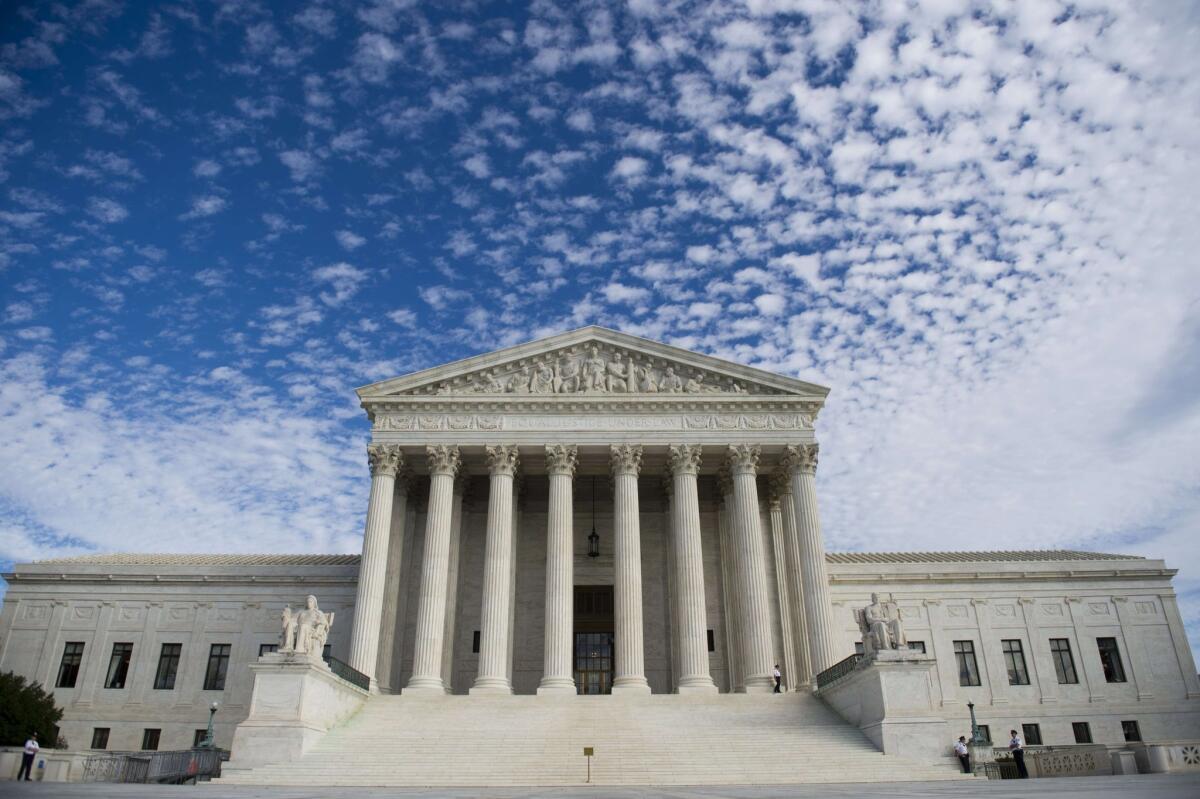Supreme Court strengthens free-speech rights of public employees

- Share via
Reporting from Washington — Just in time for the election season, the Supreme Court has strengthened the rights of the nation’s 22 million public employees to protect them against being demoted or fired for supporting the wrong political candidate in the eyes of their supervisors.
“The Constitution prohibits a government employer from discharging or demoting an employee because the employee supports a particular political candidate,” Justice Stephen G. Breyer said Tuesday.
This applies, he said, even if a supervisor mistakenly assumes an employee is supporting a particular candidate. What counts is “the employer’s motive,” Breyer said.
See more of our top stories on Facebook >>
The 6-2 decision closes a gap in the law that prompted some judges to deny legal protection to municipal workers who were demoted because of their supervisor’s false perceptions about their political leanings. In these cases, judges said the 1st Amendment is only triggered when the employee actually spoke out or participated in a political campaign.
In Tuesday’s opinion, Breyer said the 1st Amendment extends more broadly and forbids the government from acting “upon a constitutionally harmful policy” of punishing political views, whether real or perceived.
The decision in Heffernan vs. City of Paterson revived a free-speech lawsuit brought by a New Jersey police detective who was demoted because he was seen carrying a campaign sign supporting the mayor’s opponent. In fact, he was simply putting the sign in his car to deliver it to his mother, not because he was supporting the mayor’s opponent.
But a federal judge in New Jersey and the 3rd Circuit Court of Appeals said Jeffrey Heffernan, the police detective, could not sue under the 1st Amendment because he did not engage in “1st Amendment conduct.” The appeals court said demoted employees can sue for retaliation only if they could point to an “actual, rather than perceived, exercise of constitutional rights.”
The high court justices said Tuesday that made no sense.
NEWSLETTER: Get the day’s top headlines from Times Editor Davan Maharaj >>
“The government’s reason for demoting Heffernan is what counts here,” Breyer said. “When an employer demotes an employee out of desire to prevent the employee from engaging in political activity that the 1st Amendment protects, the employee is entitled to challenge that unlawful action.”
His opinion was joined by all the justices except Justices Clarence Thomas and Samuel A. Alito Jr.
The demoted police officer did not show his employer “infringed his constitutional rights to speak freely,” Thomas said, even if the “city’s demotion of him may be misguided or wrong.”
The decision is a victory for the UCLA Law School’s Supreme Court Clinic and professors Stuart Banner and Eugene Volokh. They helped write an appeal petition last year warning the 3rd Circuit Court’s ruling would have “disastrous consequences” for public employees if it became accepted as law.
It would mean “if the boss is left with the mistaken impression that an employee is a Democrat, or a Republican, or anything else, the employee can be fired,” they wrote. “Public employees would need to avoid even acting or talking in any way that a supervisor might think is characteristic of Democrats or Republicans…. A rule with such bizarre consequences cannot be right.”
In the past, the court has been divided on free-speech rights for public employees. The justices have said school teachers, municipal workers and others have a right to speak out as citizens on “matters of public concern.” However, the 1st Amendment does not protect them if they disagree with their employers about a workplace dispute, they said.
Ten years ago, in a case called Garcetti vs. Ceballos, the court by a 5-4 vote said a whistle-blower within the county prosecutor’s office could not claim free-speech protection for speaking out against the handling of a disputed police search warrant. In that case, the court said the complaint by the Los Angeles County deputy district attorney arose from a workplace dispute and therefore, did not have 1st Amendment protection.
A few weeks ago, the court split 4-4 on whether school teachers and other public employees had a free-speech right to refuse to pay collective bargaining fees to their union.
On Twitter: @DavidGSavage
ALSO
Four consequences of a $15 minimum wage
Education group enters ‘belly of the beast’ to oppose North Carolina’s LGBT law
As Clinton and Sanders spar over gun control, Newtown, Conn., is drawn into unwanted spotlight
More to Read
Sign up for Essential California
The most important California stories and recommendations in your inbox every morning.
You may occasionally receive promotional content from the Los Angeles Times.











